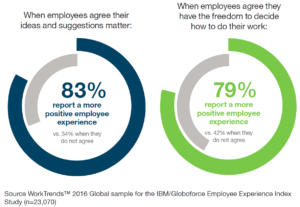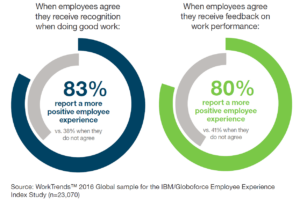The perils of ignoring non-managerial staff
- 4 Min Read
Many organisations are damaging employee performance, productivity, engagement and retention by not considering the needs of their frontline staff.
- Author: Owain Thomas
- Date published: Oct 17, 2016
- Categories

Many organisations are damaging employee performance, productivity, engagement and retention by not considering the needs of their frontline staff.
Two significant multinational research projects revealed that non-managerial staff were often disconnected from their job and workplace with only around one in three proud to work for the organisation.
This was in contrast to more senior management where engagement and attachment to the organisation increased substantially.
The results showed a remarkable difference in performance and attitude from those employees who felt empowered and supported and those who felt ignored and isolated.
More than 23,000 employees in 45 countries were questioned by IBM and Globoforce revealing that employers who were responsive to the needs of their staff saw significant improvements.
Workers with Employee Experience Index scores in the top quartile were more likely to report high levels of work performance than those whose scores were in the bottom quartile.
Connected leaders
The report noted that “employee experience has its beginnings in the direction and support of leaders and managers, who drive organisational practices that create the employee experience.
“Ultimately, a positive employee experience is associated with improved employee outcomes such as better job performance, increased discretionary effort and higher retention,” it added.
Discretionary effort was almost twice as high (95% compared to 55%) in environments which were strongly responsive to employee needs, suggesting a stronger employee experience can contribute to higher motivation levels to go beyond typical job duties.
Employees with less positive experiences were more than twice as likely to say they wanted to leave (44%) compared to those with much more positive experiences (21%).
Glassdoor: Moments of magic will build your brand
Quick fix
 The reasons for this disconnect were varied but all focused on elements that could potentially be easily considered and corrected.
The reasons for this disconnect were varied but all focused on elements that could potentially be easily considered and corrected.
Staff who felt their ideas and suggestions mattered were more than twice as likely (83% vs 34%) to report a positive employee experience than those who did not and a similar pattern emerged among employees who have the freedom to decide how to do their work (79% vs 42%).
Only 56% of employees felt their senior leaders provided clear direction about where the organisation was headed.
Recognition and feedback
 Being recognised for good work was also critical as 83% of employees reported a positive experience when they felt recognised for the good work they did, compared to 38% that did not receive recognition.
Being recognised for good work was also critical as 83% of employees reported a positive experience when they felt recognised for the good work they did, compared to 38% that did not receive recognition.
“Engaged employees have pride in and are satisfied with their organization as a place to work, and they advocate for and intend to remain with their organization,” the report continued.
“However, employee engagement may not tell the whole story of the employee experience at work. In fact, employee experience and engagement go hand in hand to reflect employees’ states at work,” it added.
Majority dissatisfaction
These trends were witnessed in Oracle’s survey of Western Europe (1,200 workers from France, Germany, the Netherlands, Spain and the UK responded) where the majority of non-management level employees were dissatisfied with their workplace culture.
Just 37% of non-management employees were proud to work for their organisation; the sentiment for manager and director level employees was 70%.
This feeling of being ignored or less supported was expressed in several ways.
Just 22% of employees outside the management ranks felt their company was concerned with their overall well-being and less than one-third felt their business leaders were visible and approachable.
Only 25% of non-managers said their learning and training was specific to their personal development plan and only 22% said their company provided the technology and tools to promote their development.
The Generation Y myths busted
Senior engagement
In contrast, more than 60% of senior managers and directors felt their training was individually appropriate and nearly three-quarters had access to what they needed for development.
The result of this disconnect was a widespread sense of disillusionment among those in non-management positions with only 21% believing they could advance their career with their current employer and just 39% see a long-term future there.
The IBM-Globoforce survey also detected a shift in engagement and satisfaction between non-managerial and managerial employees.
It found that the more senior a responded was, the more positive the employee experience.
Individual contributors (employees who did not manage others) reported a lower level of
employee experience (63%) than managers (79%).
It noted that such a gap was not unique and other studies of worker opinions often found managers tended to have a more positive attitude to work than individual contributors.
Hear Hilton Worldwide VP of HR for EMEA Ben Bengougam answer ‘How do you make engagement happen?’ at the HR Directors Summit 2017.









